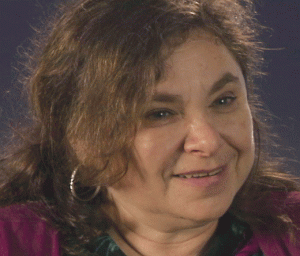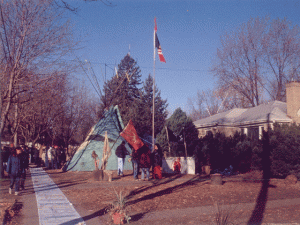New documentary chronicles the urban effort to save trees and stop a Minneapolis highway project
Â
By MORDECAI SPECKTOR
Â
Disillusioned words like bullets bark
As human gods aim for their markӬ
Made everything from toy guns that spark
To flesh-colored Christs that glow in the dark
It’s easy to see without looking too far”¨
That not muchӬ
Is really sacred.
— “It’s Alright, Ma (I’m Only Bleeding)” by Bob Dylan
Â
 What if highway officials showed up at your shul on a Saturday morning and declared that the building would be destroyed and the land beneath it used for a new highway right-of-way?
Something like that played out during the late ’90s, in the contentious struggle over the re-route of Hwy. 55 (Hiawatha Avenue), which runs through the Minnehaha corridor in Minneapolis. As part of the construction of the Light Rail Transit (LRT) line, the urban highway was redirected over homes on Riverview Road, and through a rare oak savannah, primeval springs, and land held to be sacred by the Dakota people who settled the area prior to the coming of the Europeans.
Feisty Earth First! tree-sitters, American Indian Movement activists, members of the Mendota Mdewakanton Dakota Community, and various other concerned citizens comprised the stalwart resistance to the highway project. The battles between the authorities and the stop the re-route partisans are captured in a lively, locally produced documentary, Stop the Re-Route: Taking a Stand on Sacred Land, which will have its first public showings this weekend and next.
Of course, what’s a social movement without Jews? Lynn Levine, a New York native transplanted to the Twin Cities 40 years ago, is one of the engaging personalities highlighted in the film. Levine’s first environmental crusade was opposing a condo development sited on the Ewing Wetlands, near Cedar Lake in Minneapolis. Following that issue, Levine was introduced to Carol Kratz, a longtime resident of Riverview Road, whose home was in the path of the Hwy. 55 re-route.
During a phone interview with the AJW this week from New York, where Levine was visiting her mother, she recalled that her early involvement with the Hwy. 55 issue consisted of “going to meetings, calling legislators, writing letters… working through the different lawsuits.”
The appearance of Earth First! environmental activists on the scene changed the dynamics of the issue, according to Levine.
“Then it became what the movie is about, that sit-in thing,” Levine commented, about the remarkable scenes of an urban occupation to save green space.
Stop the Re-Route — co-produced by Ann Follett, Jon Carlson, Jim Gambone and Scott Cramer — depicts numerous direct action tactics to impede road work by contractors for the Minnesota Department of Transportation (MnDOT).
The Earth Firsters would attach U-shaped bike locks around their necks and to heavy construction machinery; others engaged in long-term “tree-sits,” which involved slinging a hammock and provisions in the upper branches of massive trees.
Indian participants contributed to the spiritual component of the stop the re-route movement, which extended over 1998 and 1999, through two Minnesota winters. In an article from the Dec. 14, 1998, edition of the American Jewish World (“Foes of Hwy. 55 reroute vow to protect Mother Earth”), Jim Anderson (Makpiyaduta, the name means “Scarlet Sky” in Dakota), cultural chair of the Mendota Mdewakanton Dakota Community, said that the occupation of Riverview Road, known as Camp Two Pines, “isn’t just for the Indian people. This is for the four colors of man — there’s prophecies that it’s going to take the four colors of man to save this earth for our future generations, and that’s the premise that we’re here.”
Indeed, as part of MnDOT environmental impact assessment process, a hearing was convened to determine if a portion of the re-route site, a historic area known as Camp Coldwater, had sacred significance to Indian people.Â
“Those were amazing,” Levine recalled about the hearings. “First we couldn’t get the Natives to bite; then all of a sudden it happened — Native elders came from all over the country to testify. And the testimony was so strong. It was just a privilege to be there and listen to them.”
But having a secular bureaucracy — the agency charged with highway construction — judge the validity of Indian spiritual viewpoints seems like an exercise in futility.
However, Levine recalls that she was hopeful about the outcome. She figured: “People were going to hear this and they’re going to stop. It felt real. Then, in the film I say, that incredible experience was considered an appendix to the report that found that the land was not sacred.”
Although the Indians asserted that they had a sacred attachment to Coldwater Spring, which provided water for the first European settlers at Fort Snelling (then called Fort Anthony), the defenders of the land sought for a new highway were swept away in a series of raids. In the waning days of Gov. Arne Carlson’s administration, Camp Two Pines was cleared out in a massive predawn police raid on Dec. 22 — reporters were kept at bay, so there were no witnesses to the alleged police brutality inflicted on the activists. Several dozen more activists were arrested the following year, when MnDOT contractors moved in to saw down the Four Sacred Oaks that were being protected from the Hwy. 55 re-route.
Stop the Re-Route is an exemplary documentary of contemporary history. It boasts excellent production values, a cast of engaging and profound characters, and ample humor.
“There were big highs and big lows,” Levine recalled about her days in the stop the re-route struggle. She mentioned that in the film an activist named Solstice summed up the consensus feeling that MnDOT and the authorities would prevail.
“It became harder and harder and harder to do it with your whole heart,” said Levine, “because you saw that it was coming to an end: They were going to take the trees, they were going to put the road through, there was going to be that steamrolling over people’s needs, and the bad guys were going to win. I mean that’s how it felt… and then again, we had a huge political presence after that.”
Levine is now a DFL delegate in Minneapolis — and she remembers the politicians who were on the wrong side of the re-route issue. Ten years later, they will still be called to account for their past deeds by the defenders of Camp Two Pines.
***
Stop the Re-Route: Taking a Stand on Sacred Land will be shown 2 p.m. Saturday, March 21 at the Walker Art Center, as part of the Women with Vision 2009 series. Director Ann Follett will introduce the film.
The community premiere of the film will take place 7 p.m. Saturday, March 28 in the auditorium at Roosevelt High School, 4029 28th Ave. S., Minneapolis. Tickets are $5.





















Mordecai–What an excellent and perceptive account of this inspiring community effort! Thank you, thank you. -Jon